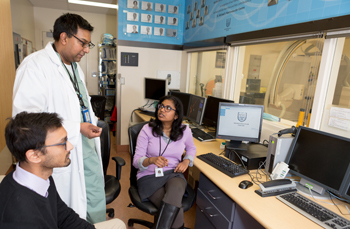From paper-based to ironclad

By Geoff Koehler

Dr. Aditya Bharatha (standing), an interventional neuroradiologist with St. Michael’s, with Saad Ahmed and Samara Seepersad — two upper-year Ryerson biomedical engineering students. The trio developed a new patient booking system for the hospital’s Neurovascular Clinic. (Photo by Yuri Markarov)
St. Michael’s Neurovascular Clinic is a hub of technology. The clinic’s team uses advanced imaging and state-of-the-art devices to treat blood vessel leaks, blockages or malformations in patients’ brains using minimally invasive techniques.
But when it comes to booking patients, the clinic’s approach has been decidedly low-tech.
“Right now, when I see a patient in the clinic, I’ll write down when the patient should be booked next for followup imaging or procedures on a paper form,” said Dr. Aditya Bharatha, an interventional neuroradiologist and part of St. Michael’s Medical Imaging Department. “If I want to see them next in August, that page gets put in a binder that will be re-opened in July to start scheduling. It’s not a perfect system.”
Dr. Bharatha said regular followup is crucial because neurovascular illnesses can progress without warning signs or symptoms. He said sometimes the only way to tell if a patient is doing well or is at risk of a sudden stroke is to perform imaging, such as magnetic resonance imaging or a computerized tomography scan.
The clinic’s paper-based booking system may soon change with the help of Saad Ahmed and Samara Seepersad — two upper-year Ryerson University biomedical engineering students.
Ahmed and Seepersad found their way to the Neurovascular Clinic’s project through the Biomedical Zone — a partnership between Ryerson and St. Michael’s that fosters clinical innovation and health-care commercialization.
Did you know? The Co-Development Lab was created by the Biomedical Zone team, including Nabil Uddin, a fourth-year Ryerson biomedical engineering student who wanted to increase opportunities for students to gain clinical experience. The lab brings clinicians, scientists, engineers and other innovators with the right skillsets together to develop solutions that can make lives better for patients. |
“Our Co-Development Lab works with St. Michael’s clinicians, patients and other health experts to identify clinical challenges,” said Dr. Linda Maxwell, executive director of the Biomedical Zone. “We then bring in upper-year Ryerson students who have the skills to co-create a solution with the guidance and expertise of St. Michael’s clinical and administrative leaders.”
The two student volunteers spent eight months working with Dr. Bharatha to develop an electronic booking system that met the specific needs of these patients and the clinic’s workflow. With this program, when a new patient comes in, the clinic staff will add them to the system and be prompted to schedule visits and procedures.
“If an appointment is missed, the system alerts us right away to follow up,” said Dr. Bharatha. “This tool will optimize patient safety and tracking. It’s an ironclad way to make sure referred patients and treated patients are not lost to followup.”
The booking system has been developed with feedback from the clinic’s physicians and staff. The project team, including Dr. Bharatha, is working with St. Michael’s IT to implement the system on trial basis. Dr. Bharatha said, if successful, the long-term goal is to integrate this program into the hospital’s systems.
“What’s special about this Biomedical Zone’s Co-Development Lab project, is that the work Saad and I are doing affects people and their lives,” said Seepersad, who has since graduated and begun working as an associate technical analyst at Techna Institute. “Not every student has a chance to work with clinicians on real-world projects and I think it’s part of why I got this great job. I was able to show that I could help create a product that’s useful for a client and will be used for years to come.”
About St. Michael’s Hospital
St. Michael’s Hospital provides compassionate care to all who enter its doors. The hospital also provides outstanding medical education to future health care professionals in 27 academic disciplines. Critical care and trauma, heart disease, neurosurgery, diabetes, cancer care, care of the homeless and global health are among the hospital’s recognized areas of expertise. Through the Keenan Research Centre and the Li Ka Shing International Healthcare Education Centre, which make up the Li Ka Shing Knowledge Institute, research and education at St. Michael’s Hospital are recognized and make an impact around the world. Founded in 1892, the hospital is fully affiliated with the University of Toronto.
